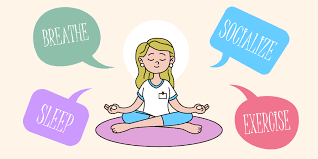Managing Stress: Strategies for a Balanced Life
In today’s fast-paced world, stress has become an inevitable part of our lives. From demanding work schedules to personal responsibilities, it’s easy to feel overwhelmed and burdened by the pressures we face. However, managing stress is crucial for our overall well-being and quality of life. By adopting effective strategies, we can navigate through stressful situations with resilience and maintain a sense of balance.
- Identify the Source: The first step in managing stress is to identify its source. Take some time to reflect on what triggers your stress levels to rise. Is it work-related? Relationship issues? Financial concerns? By pinpointing the root cause, you can develop targeted strategies to address it.
- Prioritize Self-Care: Self-care is not selfish; it’s essential for managing stress. Make time for activities that bring you joy and relaxation, whether it’s reading a book, going for a walk in nature, practicing yoga, or indulging in a hobby. Taking care of your physical and mental health will enhance your ability to cope with stress.
- Practice Mindfulness: Mindfulness is the practice of being fully present in the moment without judgment. Incorporating mindfulness techniques into your daily routine can help reduce stress levels significantly. Engage in activities such as meditation or deep breathing exercises to calm your mind and cultivate a sense of inner peace.
- Establish Boundaries: Setting boundaries is crucial for managing stress effectively. Learn to say no when necessary and avoid overcommitting yourself. Understand that it’s okay to prioritize your well-being and delegate tasks when possible.
- Seek Support: Don’t hesitate to reach out for support when you’re feeling overwhelmed by stress. Talk to trusted friends or family members about what you’re going through or consider seeking professional help from a therapist or counselor who can provide guidance and coping strategies.
- Maintain a Healthy Lifestyle: A healthy lifestyle plays a vital role in managing stress. Ensure you’re getting enough sleep, eating a balanced diet, and engaging in regular physical activity. These habits contribute to your overall resilience and ability to handle stress.
- Time Management: Poor time management can lead to increased stress levels. Take control of your schedule by prioritizing tasks, setting realistic deadlines, and breaking larger tasks into smaller, more manageable steps. This approach will help you feel more organized and in control.
- Practice Positive Thinking: Cultivating a positive mindset can significantly impact your ability to manage stress. Challenge negative thoughts and replace them with positive affirmations. Focus on gratitude and celebrate small victories along the way.
Remember, managing stress is an ongoing process that requires patience and practice. Each individual may find different strategies that work best for them. By incorporating these techniques into your daily life, you can cultivate resilience, reduce stress levels, and create a more balanced and fulfilling life.
8 Frequently Asked Questions About Managing Stress: Tips for Reducing Stress Levels, Coping Healthily, Time Management, Warning Signs, Staying Calm, Activities for Stress Relief, Identifying Problematic Stress, and Preventing Stressful Situations
- How can I reduce my stress levels?
- What are some healthy ways to cope with stress?
- How can I manage my time better to reduce stress?
- What are the warning signs of too much stress?
- How can I stay calm when faced with stressful situations?
- What activities help relieve stress and anxiety?
- How do I know if my stress is becoming a problem?
- Is it possible to prevent or avoid stressful situations altogether?
How can I reduce my stress levels?
Reducing stress levels requires a combination of strategies that address both the physical and mental aspects of stress. Here are some effective ways to help you reduce stress:
- Exercise regularly: Physical activity releases endorphins, which are natural mood boosters. Engaging in regular exercise, whether it’s walking, jogging, dancing, or practicing yoga, can help reduce stress and promote a sense of well-being.
- Practice relaxation techniques: Incorporate relaxation techniques into your daily routine. Deep breathing exercises, progressive muscle relaxation, and guided imagery can help calm your mind and relax your body.
- Prioritize self-care: Make self-care a priority by engaging in activities that bring you joy and relaxation. This could include reading a book, taking a bath, listening to music, or spending time in nature. Taking care of yourself is essential for managing stress.
- Get enough sleep: Lack of sleep can contribute to increased stress levels. Establish a regular sleep routine and create a comfortable environment that promotes quality sleep. Aim for 7-9 hours of uninterrupted sleep each night.
- Practice mindfulness and meditation: Mindfulness practices help you stay present in the moment and cultivate awareness without judgment. Meditation can be an effective tool for reducing stress by promoting relaxation and clarity of mind.
- Set boundaries: Learn to say no when necessary and establish boundaries that protect your time and energy. Avoid taking on too many commitments or overextending yourself, as this can lead to increased stress levels.
- Seek social support: Reach out to friends, family members, or support groups when you’re feeling stressed. Sharing your concerns with others can provide emotional support and different perspectives on managing stress.
- Manage time effectively: Poor time management often leads to increased stress levels. Prioritize tasks based on importance and urgency, delegate when possible, and break larger tasks into smaller manageable steps.
- Limit exposure to stress triggers: Identify situations or people that consistently trigger stress and try to limit your exposure to them. If certain environments or relationships are causing significant stress, consider making necessary changes for your well-being.
- Practice positive thinking: Focus on positive thoughts and practice gratitude. Challenge negative self-talk and replace it with affirmations and positive affirmations. Cultivating a positive mindset can help reduce stress levels.
Remember, managing stress is an ongoing process, and what works for one person may not work for another. It’s essential to explore different strategies and find what resonates with you. If your stress levels persist or become overwhelming, don’t hesitate to seek professional help from a therapist or counselor who can provide additional guidance and support.
What are some healthy ways to cope with stress?
When it comes to coping with stress, it’s important to adopt healthy strategies that promote your well-being and provide long-term benefits. Here are some healthy ways to cope with stress:
- Exercise: Engaging in regular physical activity, whether it’s going for a run, practicing yoga, or taking a dance class, can help reduce stress levels. Exercise releases endorphins, which are natural mood boosters and help alleviate stress.
- Practice Relaxation Techniques: Incorporate relaxation techniques into your daily routine to calm your mind and body. Deep breathing exercises, progressive muscle relaxation, and meditation can help reduce stress and promote a sense of calmness.
- Maintain a Healthy Lifestyle: Prioritize self-care by eating a balanced diet, getting enough sleep, and avoiding excessive caffeine or alcohol consumption. A healthy lifestyle provides the foundation for resilience in managing stress.
- Seek Social Support: Reach out to friends, family members, or support groups when you’re feeling stressed. Talking about your feelings and concerns with trusted individuals can provide comfort and perspective.
- Time Management: Effective time management can alleviate stress caused by overwhelming tasks or deadlines. Prioritize your responsibilities, break them down into manageable chunks, and create a schedule that allows for breaks and relaxation.
- Engage in Hobbies: Dedicate time to activities you enjoy that bring you happiness and relaxation. Whether it’s painting, gardening, playing an instrument, or reading books, hobbies offer an outlet for stress relief.
- Set Boundaries: Learn to say no when necessary and establish boundaries in your personal and professional life. Setting realistic expectations for yourself reduces feelings of overwhelm and helps manage stress levels effectively.
- Practice Mindfulness: Incorporate mindfulness into your daily routine by being fully present in the moment without judgment. Mindful practices like meditation or mindful eating can help reduce anxiety and increase overall well-being.
- Get Creative: Engaging in creative outlets such as writing, drawing, or crafting can be therapeutic and help channel your emotions in a healthy way. Expressing yourself creatively provides a sense of release and relaxation.
- Seek Professional Help: If stress becomes overwhelming and affects your daily functioning, don’t hesitate to seek professional help. A therapist or counselor can provide guidance specific to your situation and offer coping strategies tailored to your needs.
Remember, everyone copes with stress differently, so it’s essential to find what works best for you. By adopting healthy coping mechanisms, you can effectively manage stress and maintain a balanced lifestyle.
How can I manage my time better to reduce stress?
Managing time effectively is crucial for reducing stress and achieving a better work-life balance. Here are some strategies to help you manage your time more efficiently:
- Prioritize Tasks: Start each day by identifying the most important tasks that need to be completed. Focus on high-priority items and tackle them first. This way, you can prevent feeling overwhelmed and ensure that essential tasks are completed on time.
- Set Realistic Goals: Be realistic about what you can accomplish within a given timeframe. Avoid overloading your schedule with too many tasks, as this can lead to stress and burnout. Set achievable goals that align with your available time and resources.
- Break Tasks into Smaller Steps: Large projects or tasks can appear daunting, causing stress and procrastination. Break them down into smaller, more manageable steps. This approach makes the task seem less overwhelming and allows you to make progress incrementally.
- Create a Schedule or To-Do List: Utilize tools like calendars, planners, or digital apps to create a schedule or to-do list. Allocate specific time slots for different activities and prioritize accordingly. Having a visual representation of your tasks helps you stay organized and focused.
- Avoid Multitasking: Contrary to popular belief, multitasking often reduces productivity and increases stress levels. Instead, focus on one task at a time, giving it your full attention before moving on to the next one.
- Learn to Delegate: If possible, delegate tasks that can be handled by others without compromising quality or efficiency. Delegating not only reduces your workload but also empowers others to contribute their skills and expertise.
- Minimize Distractions: Identify common distractions in your environment (e.g., social media, emails) and take steps to minimize them during focused work periods. Consider turning off notifications or using productivity apps that block certain websites temporarily.
- Take Regular Breaks: Taking breaks is essential for maintaining productivity and reducing stress. Incorporate short breaks into your schedule to rest, recharge, and clear your mind. Use this time to engage in activities that help you relax and rejuvenate.
- Learn to Say No: It’s important to set boundaries and learn to say no when necessary. Overcommitting yourself can lead to excessive stress and a lack of time for self-care or important tasks. Prioritize your well-being by being selective about the commitments you take on.
- Practice Time Blocking: Time blocking involves allocating specific blocks of time for different activities or categories of tasks. This technique helps you stay focused and prevents tasks from bleeding into one another.
Remember, managing time effectively is an ongoing process that requires self-awareness, discipline, and flexibility. Experiment with different strategies to find what works best for you, and be willing to adjust your approach as needed. By implementing these techniques, you can reduce stress levels, increase productivity, and create a more balanced lifestyle.
What are the warning signs of too much stress?
Excessive stress can manifest in various ways, affecting both our physical and mental well-being. It’s important to be aware of the warning signs so that we can take proactive steps to manage and reduce stress levels. Here are some common warning signs of too much stress:
Physical Symptoms:
– Frequent headaches or migraines
– Muscle tension or pain, especially in the neck, shoulders, or back
– Digestive problems such as stomachaches, indigestion, or irritable bowel syndrome (IBS)
– Fatigue and low energy levels
– Insomnia or changes in sleep patterns
– Weakened immune system leading to frequent illnesses
Emotional and Behavioral Changes:
– Increased irritability, moodiness, or agitation
– Feeling overwhelmed or unable to relax
– Anxiety or excessive worry
– Difficulty concentrating or making decisions
– Changes in appetite (overeating or loss of appetite)
– Social withdrawal and isolation
– Procrastination or lack of motivation
Cognitive Symptoms:
– Racing thoughts or constant worrying
– Memory problems and difficulty concentrating
– Poor judgment and decision-making abilities
Emotional Well-being:
– Feeling anxious, fearful, or on edge constantly
– Increased feelings of sadness, depression, or hopelessness
– Loss of interest in activities once enjoyed
Relationship Issues:
– Increased conflicts with family members, friends, or colleagues due to irritability and mood swings
– Decreased patience and tolerance for others
It’s important to note that everyone experiences stress differently, so these warning signs may vary from person to person. If you notice several of these symptoms persisting over an extended period and impacting your daily life significantly, it is advisable to seek professional help from a healthcare provider or therapist who can provide guidance and support.
Remember that recognizing the warning signs early on allows you to take proactive steps towards managing stress effectively and maintaining overall well-being.
How can I stay calm when faced with stressful situations?
Staying Calm in Stressful Situations: Techniques for Inner Peace
When faced with stressful situations, it’s natural to feel overwhelmed and anxious. However, staying calm is essential for making clear decisions and maintaining your well-being. Here are some techniques to help you stay calm when faced with stress:
- Deep Breathing: Deep breathing is a powerful technique to instantly calm your mind and body. Take slow, deep breaths in through your nose, hold for a few seconds, and exhale slowly through your mouth. Focus on the sensation of your breath entering and leaving your body, allowing yourself to relax with each exhale.
- Practice Mindfulness: Mindfulness involves paying attention to the present moment without judgment. When stress arises, bring your focus to the sensations in your body or engage in activities with full awareness. This practice helps shift your attention away from worries and brings you back to the present, promoting a sense of calm.
- Positive Self-Talk: Replace negative self-talk with positive affirmations. Remind yourself that you are capable of handling the situation and that challenges are opportunities for growth. Repeat calming phrases such as “I am capable,” “I can handle this,” or “This too shall pass” to reinforce a positive mindset.
- Take a Break: Sometimes, stepping away from a stressful situation can provide much-needed perspective and help you regain composure. Take short breaks throughout the day to engage in activities that relax you, such as going for a walk, listening to calming music, or practicing a hobby.
- Prioritize Self-Care: Taking care of yourself is crucial during stressful times. Ensure you’re getting enough sleep, eating nourishing meals, and engaging in regular exercise or physical activity. Self-care activities like taking a warm bath or practicing relaxation techniques can also help restore inner balance.
- Seek Support: Don’t hesitate to reach out for support when needed. Talk to a trusted friend, family member, or therapist who can provide guidance and a listening ear. Sharing your feelings and concerns can help alleviate stress and provide valuable insights.
- Focus on Solutions: Instead of dwelling on the problem, shift your focus toward finding solutions. Break down the issue into smaller, manageable steps and take proactive measures to address them. By focusing on solutions, you regain a sense of control and reduce stress levels.
- Visualize Success: Use the power of visualization to imagine yourself successfully navigating through the stressful situation. Close your eyes and visualize yourself calmly handling the challenge, achieving positive outcomes, and feeling a sense of relief. This technique can help reduce anxiety and increase confidence.
Remember, staying calm in stressful situations takes practice. Be patient with yourself as you develop these techniques, and don’t hesitate to adapt them to suit your individual needs. With time and perseverance, you’ll cultivate inner peace and resilience in the face of stress.
What activities help relieve stress and anxiety?
When it comes to relieving stress and anxiety, different activities work for different people. Here are some widely recognized activities that can help promote relaxation and reduce stress:
- Exercise: Physical activity releases endorphins, which are natural mood boosters. Engaging in regular exercise, such as walking, jogging, yoga, or dancing, can help reduce stress levels and improve overall well-being.
- Mindfulness and Meditation: Practicing mindfulness and meditation techniques can help calm the mind and bring a sense of peace. These practices involve focusing on the present moment, observing thoughts without judgment, and deepening self-awareness.
- Deep Breathing Exercises: Deep breathing exercises activate the body’s relaxation response. Techniques like diaphragmatic breathing or box breathing can help lower heart rate, reduce muscle tension, and induce a state of calmness.
- Engaging Hobbies: Participating in activities you enjoy can be a great way to distract yourself from stressors. Whether it’s painting, playing an instrument, gardening, or cooking, hobbies provide a sense of fulfillment and relaxation.
- Spending Time in Nature: Nature has a soothing effect on our minds and bodies. Taking walks in green spaces or spending time near water can help reduce stress levels and promote feelings of tranquility.
- Journaling: Writing down your thoughts and feelings in a journal allows you to release emotions and gain clarity. It can be a therapeutic practice that helps process stressors and find solutions.
- Socializing: Connecting with loved ones or engaging in social activities can provide emotional support during stressful times. Sharing experiences with others helps alleviate anxiety by fostering a sense of belonging.
- Listening to Music: Listening to calming music or your favorite tunes can have a positive impact on mood by reducing stress hormones and promoting relaxation.
- Progressive Muscle Relaxation (PMR): PMR involves systematically tensing and relaxing different muscle groups to release physical tension. This technique can help promote relaxation and alleviate stress-related symptoms.
- Engaging in Self-Care: Taking care of yourself is essential for stress management. Engage in activities like taking a warm bath, practicing aromatherapy, getting a massage, or indulging in a favorite hobby to nurture your well-being.
Remember that everyone is unique, so it’s important to explore different activities and find what works best for you. Experiment with these techniques and incorporate them into your routine to create a personalized stress relief plan. If stress and anxiety persist or become overwhelming, seeking professional help from a therapist or counselor is always recommended.
How do I know if my stress is becoming a problem?
Stress is a natural response to challenging or demanding situations, and it can motivate us to take action and perform at our best. However, when stress becomes overwhelming and starts to interfere with your daily life, it may be a sign that it has become a problem. Here are some indicators that your stress levels may be reaching an unhealthy level:
- Physical Symptoms: Pay attention to physical signs of stress such as headaches, muscle tension, digestive issues, frequent illnesses, changes in appetite or sleep patterns, fatigue, or increased heart rate. These symptoms can be indications that your body is experiencing excessive stress.
- Emotional Changes: Notice any significant shifts in your emotional well-being. If you find yourself feeling constantly anxious, irritable, overwhelmed, or moody without apparent reason, it could be a sign that stress is becoming problematic.
- Decreased Concentration and Productivity: When stress levels rise excessively, it can impair your ability to concentrate and perform tasks effectively. If you’re finding it increasingly difficult to focus or complete assignments on time due to racing thoughts or mental exhaustion caused by stress, it’s important to address the issue.
- Withdrawal and Isolation: Excessive stress can lead to social withdrawal and isolation. If you find yourself avoiding social activities or distancing yourself from loved ones due to feelings of overwhelm or inability to cope with stressors, it may be an indication that your stress levels have become problematic.
- Neglecting Self-Care: When stress takes over, self-care often takes a backseat. If you notice a significant decline in activities that bring you joy or neglecting basic self-care practices like proper nutrition, exercise, sleep hygiene, or personal grooming routines due to overwhelming stress levels, it’s important to address the situation.
- Escapist Behaviors: Turning to unhealthy coping mechanisms such as excessive alcohol consumption, drug use, overeating, overspending, or other addictive behaviors to escape or numb the stress can be a sign that stress is becoming unmanageable.
- Chronic Worry: Excessive worry about various aspects of life, constant anticipation of negative outcomes, or persistent feelings of dread can indicate that stress has become a problem.
If you recognize several of these signs and they persist for an extended period, it may be time to seek support from a healthcare professional or therapist who can help you develop effective strategies to manage and reduce your stress levels. Remember, it’s important to prioritize your well-being and take proactive steps to address excessive stress before it negatively impacts your mental and physical health.
Is it possible to prevent or avoid stressful situations altogether?
While it may not be possible to completely prevent or avoid stressful situations altogether, there are certain steps you can take to minimize their occurrence and impact on your life. Here are some strategies to consider:
- Identify Triggers: Pay attention to the situations, people, or activities that tend to trigger stress for you. By recognizing these triggers, you can develop strategies to either avoid them or better cope with them when they arise.
- Set Realistic Expectations: Often, stress arises when we set unrealistic expectations for ourselves or others. Strive for a balanced approach and set achievable goals that align with your capabilities and resources.
- Communicate Clearly: Miscommunication or lack of communication can lead to misunderstandings and unnecessary stress. Practice effective communication skills by expressing your needs, concerns, and boundaries clearly and assertively.
- Time Management: Poor time management can contribute to stress levels. Prioritize tasks, create schedules, and allocate time for breaks and self-care activities. This will help you stay organized and reduce the likelihood of feeling overwhelmed.
- Learn Stress Management Techniques: Equip yourself with effective stress management techniques such as deep breathing exercises, meditation, mindfulness practices, or engaging in activities that bring you joy and relaxation. These techniques can help you cope with stressful situations more effectively.
- Build a Support System: Surround yourself with a supportive network of family members, friends, or colleagues who can provide guidance, encouragement, and a listening ear during challenging times.
- Take Care of Your Physical Health: A healthy body is better equipped to handle stress. Prioritize regular exercise, maintain a nutritious diet, get enough sleep, and engage in activities that promote relaxation and rejuvenation.
- Practice Self-Care: Make self-care a priority in your life by engaging in activities that nourish your mind, body, and soul regularly. This could include hobbies you enjoy, spending time in nature, practicing mindfulness or meditation, or pampering yourself with a spa day.
While it may not be possible to avoid stress entirely, implementing these strategies can help you navigate through stressful situations more effectively and minimize their impact on your well-being. Remember that managing stress is an ongoing process, and it’s important to be patient and kind to yourself along the way.




